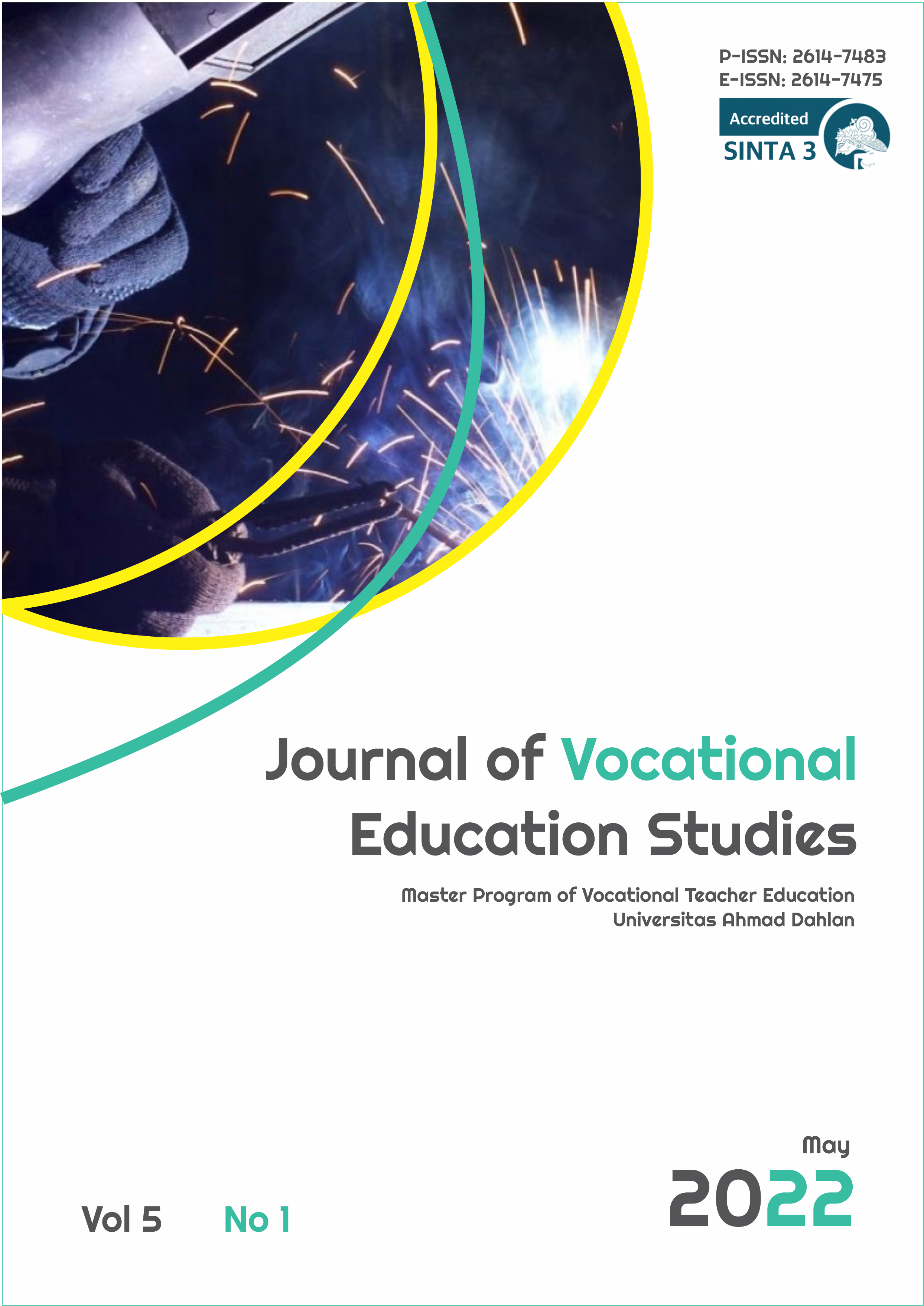Effectiveness of Information Technology (IT) Classroom Learning on Motivation and Careers Students of Junior High School
DOI:
https://doi.org/10.12928/joves.v5i1.5502Keywords:
Information Technology, effectiveness, career, motivation, learningAbstract
The purpose of this research is to analyze the level of effectiveness of the information technology-based learning process for increasing students' learning motivation and careers at SMP Muhammadiyah 2 Cilacap and to analyze the differences in the results of the learning process between information technology classes and regular classes.
The research activity was carried out using a quantitative descriptive method with a total of 76 subjects. Data collection related to the above objectives used a questionnaire. The data that has been collected is then analyzed using a real difference test, namely the independent sample t-test.
The results showed an increase in the effectiveness of the learning process and the growth of learning motivation in students. However, about careers and insight into students' careers. The results showed that the insight into the careers of the students of SMP Muhammadiyah 2 Cilacap was not optimal. Then the learning outcomes shown also experienced differences between the information technology class and the regular class.
References
Asiah, N. (2017). Analisis kemampuan praktik strategi pembelajaran aktif ( active learning ) mahasiswa PGMI Fakultas Tarbiyah dan Keguruan IAIN Raden Intan Lampung. Jurnal Pendidikan Dan Pembelajaran Dasar, 4(1), 20–33.
Cahyani, N. A. P., Bariyyah, K., & Latifah, L. (2017). Efektivitas Teknik Permainan Simulasi dengan Menggunakan Media Dart Board untuk Meningkatkan Motivasi Belajar Siswa Kelas VII C SMP Negeri 2 Tegal Siwalan Probolinggo. Jurnal Konseling Indonesia, 3(1), 22–27.
Iflakhah. (2017). Pengaruh Penggunaan Multimedia InteraktifF Berbasis Macromedia Flash 8 dan Motivasi Belajar terhadap Prestasi Belajar IPS ( Studi Pada Siswa Kelas VII MTs Negeri Bangil Kab . Pasuruan ). Jurnal Penelitian Dan Pendidikan IPS (JPPI), 11(2), 200–212.
Irawan, E., & Suryo, T. (2017). Implikasi Multimedia Interaktif Berbasis Flash Terhadap Motivasi dan Prestasi Belajar Matematika. Beta Jurnal Tadris Matematika, 10(1), 33–50.
Kahfi, M., Setiawati, W., Ratnawati, Y., & Saepuloh, A. (2021). Efektivitas Pembelajaran Kontekstual dengan Menggunakan Media Audiovisual dalam Meningkatkan Motivasi dan Prestasi Siswa pada Pembelajaran IPS Terpadu. Jurnal Ilmiah Mandala Education, 7(1), 84–89.
Khamidah, N., Winarto, & Mustikasari, V. R. (2019). Discovery Learning : Penerapan dalam pembelajaran IPA berbantuan bahan ajar digital interaktif untuk meningkatkan prestasi belajar siswa. JIPVA (Jurnal Pendidikan IPA Veteran), 3(1), 87–99.
Latip, A. (2020). Komunikasi Pada Pembelajaran Jarak Jauh Di Masa Pandemi COVID-19. Edukasi Dan Teknologi, 1(2), 107–115.
Menteri Pendidikan dan Kebudayaan Republik Indonesia. (2016). Peraturan Menteri Pendidikan dan Kebudayaan Republik
Indonesia Nomor 22 Tahun 2016 tentang Standar Proses Pendidikan Dasar dan Menengah. In Direktur Jenderal Peraturan Perundang-Undangan Kementrian hukum dan Hak Asasi Manusia Republik Indonesia (Vol. 53).
Muttaqin, R., Wagimin, & Tadjri, I. (2017). Keefektifan Layanan Informasi Karier Berbantuan Video Interaktif dan Live Modeling untuk Meningkatkan Pemahaman Karier Siswa SMP. Jurnal Bimbingan Konseling, 6(2), 174–179.
Nur’aini, F. (2020). Manajemen Kelas Berbasis Ict Di Smp Muhammadiyah 1 Purwokerto Kecamatan Purwokerto Selatan Kabupaten Banyumas. IAIN Purwokerto.
Nurcahya, A. (2018). Lemahnya Motivasi Belajar pada Siswa di Sekolah.
Risqiyain, L. H., & Purwanta, E. (2019). Pengembangan Multimedia Interaktif Informasi Karier untuk Meningkatkan Kematangan Karier Siswa Sekolah Menengah Kejuruan. Jurnal Kajian Bimbingan Dan Konseling, 4(3), 88–93. https://doi.org/10.17977/um001v4i32019p088
Santoso, P. B. (2019). Efektivitas Penggunaan Media Penilaian Google Form terhadap Hasil Belajar Pelajaran TIK. Kebijakan Dan Pengembangan Pendidikan Di Era Revolusi Industri 4.0, (September), 287–292.
Sugihartono, et al. (2007). PSIKOLOGI PENDIDIKAN. Yogyakarta: UNY Press.
Sugiyono. (2017). Metode Penelitian Kuantitatif, Kualitatif, dan R&D. Bandung: ALFABETA.
Suharni, & Purwanti. (2018). Upaya Meningkatkan Motivasi Belajar Siswa. G-COUNS: Jurnal Bimbingan Dan Konseling, 3(1), 131–145.
Suwastika, I. W. K. (2018). Pengaruh E-Learning Sebagai Salah Satu Media Pembelajaran Berbasis Teknologi Informasi Terhadap Motivasi Belajar Mahasiswa. Jurnal Sistem Dan Informatika, 13(1), 1–5.
Downloads
Published
Issue
Section
License
Copyright (c) 2022 Universitas Ahmad Dahlan

This work is licensed under a Creative Commons Attribution-ShareAlike 4.0 International License.
Authors who publish with Journal of Vocational Education Studies (JOVES) agree to the following terms: Authors retain the copyright and grant the Universitas Ahmad Dahlan right of first publication with the work simultaneously licensed under a Creative Commons Attribution License (CC BY-SA 4.0) that allows others to share (copy and redistribute the material in any medium or format) and adapt (remix, transform, and build upon the material) the work for any purpose, even commercially with an acknowledgement of the work's authorship and initial publication in Universitas Ahmad Dahlan. Authors are able to enter into separate, additional contractual arrangements for the non-exclusive distribution of the journal's published version of the work (e.g., post it to an institutional repository or publish it in a book), with an acknowledgement of its initial publication in Universitas Ahmad Dahlan. Authors are permitted and encouraged to post their work online (e.g., in institutional repositories or on their website) prior to and during the submission process, as it can lead to productive exchanges, as well as earlier and greater citation of published work (See The Effect of Open Access).










.png)



